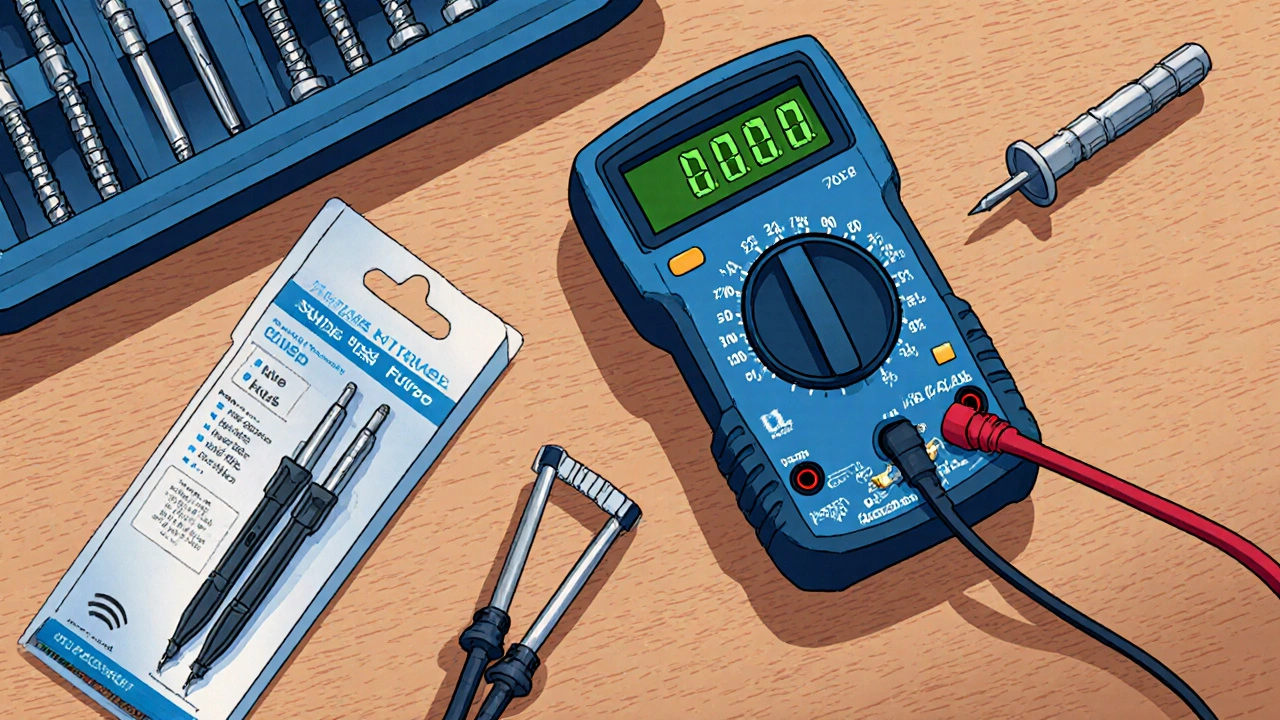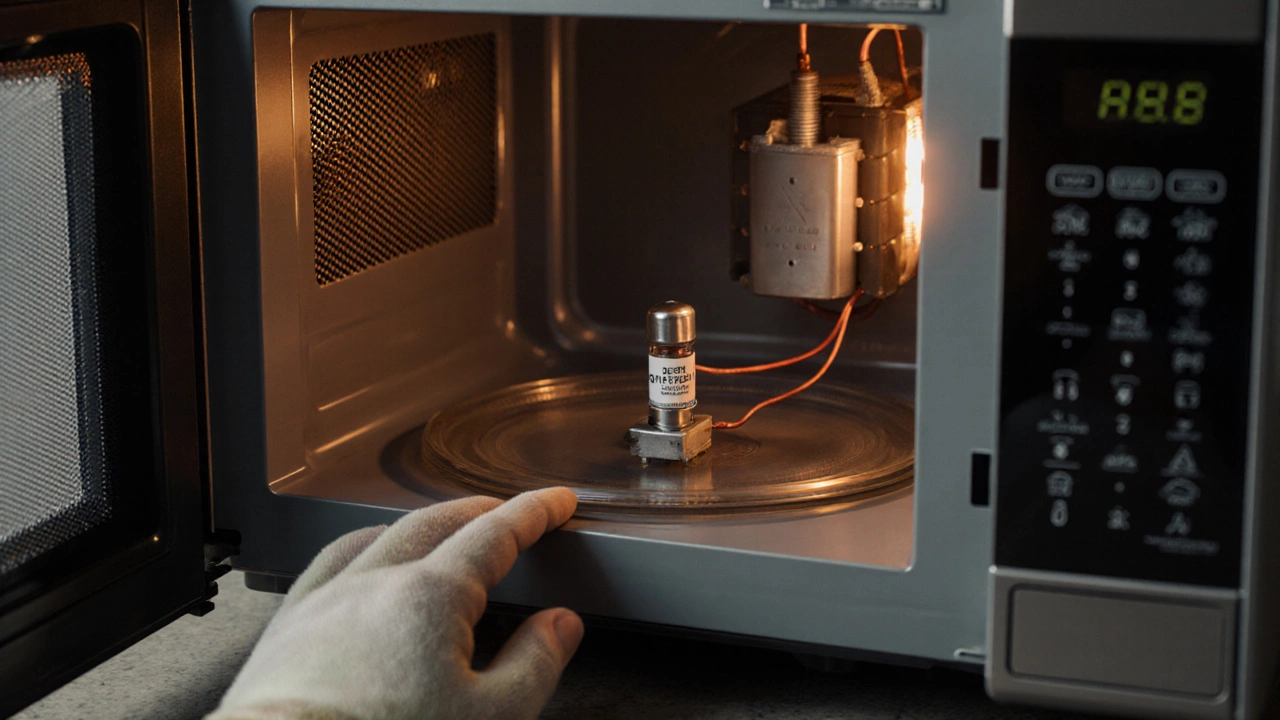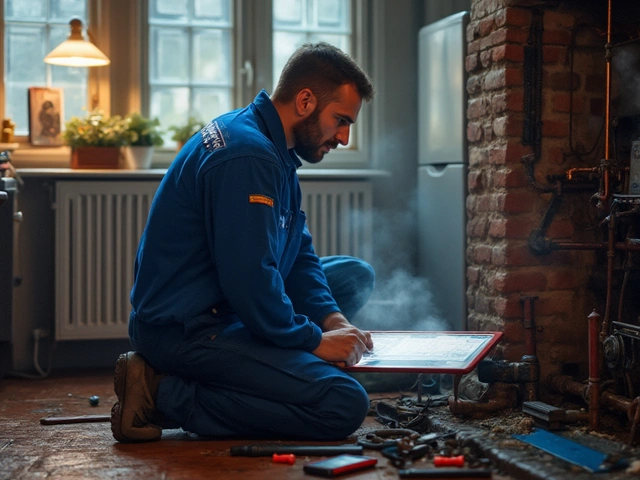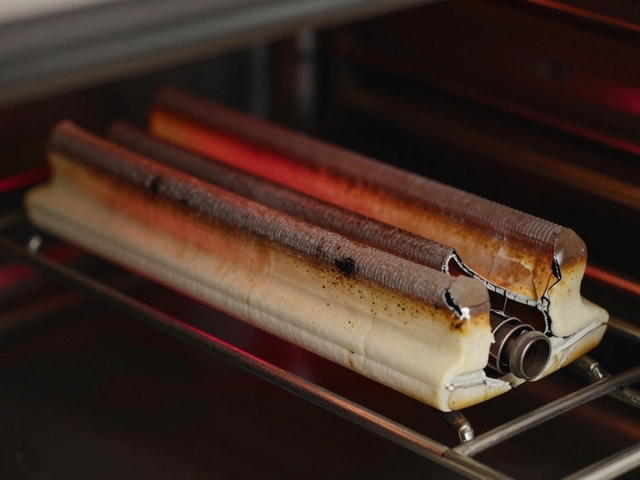Microwave Fuse Repair Cost Calculator
Estimate Your Repair Cost
Select your microwave fuse type and service preference to see potential repair costs.
Estimated Repair Cost
Enter your choices above to see costs.
When your microwave suddenly stops heating, the culprit is often a blown Microwave fuse is a safety component that interrupts power if the unit overheats or experiences an electrical fault. Knowing how much it costs to fix that fuse can save you time and money, whether you plan to roll up your sleeves or call a pro.
What Exactly Is a Microwave Fuse?
A microwave contains two main kinds of fuses: the High voltage fuse (protects the high‑voltage transformer) and the Thermal fuse (shuts down the oven if internal temperature gets too high). Both act like tiny circuit breakers, but they’re not resettable - once they blow, they must be replaced.
Why Do Microwave Fuses Blow?
- Food spills onto the magnetron or waveguide, causing overheating.
- Power surges from the grid or faulty wiring.
- Age‑related wear - metal fatigue can make a fuse fail even without a fault.
- Using the microwave with a cracked door or damaged door latch.
Identifying the cause helps you avoid repeat failures after the repair.
How Much Does a Replacement Fuse Cost?
Part prices vary by brand, model year, and fuse type. Below is a quick snapshot of typical retail ranges in the U.S. (as of October 2025):
| Fuse Type | Part Number Example | Typical Price (USD) |
|---|---|---|
| High voltage fuse (250 V) | GE #1861017 | $8 - $15 |
| Thermal fuse (200 °C) | Whirlpool #8206403 | $5 - $12 |
| Universal safety fuse | Panasonic #12345 | $4 - $9 |
Buying a genuine OEM part guarantees the correct rating and often comes with a short warranty. Generic versions can be cheaper but may fail sooner.

Labor Costs: DIY vs. Professional Service
Labor is where the price gap widens. A skilled Repair technician typically charges $70 - $120 per hour, and a fuse swap usually takes 30 - 45 minutes. That translates to $35 - $90 in labor.
If you decide to replace the fuse yourself, the only out‑of‑pocket cost is the part and a few tools-most notably a Multimeter to verify the fuse is truly blown.
DIY Replacement Guide (Step‑by‑Step)
- Unplug the microwave and let it sit for at least five minutes to discharge the high‑voltage capacitor.
- Remove the outer screws (usually six) and lift off the back or bottom panel.
- Locate the fuse. In most models it sits near the power cord entry, close to the transformer.
- Use a Multimeter set to continuity mode. Touch the probes to each end of the fuse; a beep means the fuse is still good.
- If the fuse fails the test, note its type and rating, then gently pull it out of its holder.
- Insert the new fuse, ensuring the orientation matches the old one (some have a marked polarity).
- Reassemble the housing, plug the unit back in, and run a short test (heat a cup of water for 30 seconds).
Safety tip: If you feel any tingling or see sparks while the unit is unplugged, stop immediately and call a professional-there could be a lingering capacitor charge.
When to Call a Professional
- The microwave shows additional symptoms like strange smells, sparking, or a dead turn‑table motor.
- You’re uncomfortable working with high‑voltage components.
- The model is under warranty-tampering could void coverage.
- Your local ordinances require licensed electricians for appliance repairs (some states).
In those cases, request a written estimate that separates parts from labor. This helps you compare quotes and avoid surprise charges.

How to Get an Accurate Quote
Call at least three Appliance repair firms and provide these details:
- Brand, model number, and age of the microwave.
- Symptoms observed (e.g., "doesn't heat," "fuse popped").
- Whether you have already identified the fuse type.
Most technicians will quote a range (e.g., $50 - $80 for part + labor) because exact labor time can vary with model complexity.
Cost Summary: Quick Reference
- Part price: $4 - $15 (average $9)
- DIY tools (multimeter, screwdriver set): $20 - $40 (one‑time investment)
- Professional labor: $35 - $90
- Total DIY cost: $9 - $15
- Total pro cost: $44 - $105 (including parts)
So the microwave fuse repair cost can be as low as ten dollars if you do it yourself, or around seventy dollars when you hire a technician.
Tips to Extend Fuse Life
- Cover the turn‑table and keep the interior clean; food debris is a common cause of overheating.
- Avoid running the microwave empty-this can cause voltage spikes.
- Use the correct power settings; high‑power bursts on small dishes can overheat the magnetron.
- Periodically inspect the door latch; a loose latch forces the safety system to engage more often.
Preventive maintenance can keep the fuse-and your microwave-running smoothly for years.
How do I know if the fuse is the problem?
A blown fuse will cause the microwave to stop heating while the display and lights may still work. Using a multimeter in continuity mode will confirm whether the fuse is open.
Can I use any fuse as a replacement?
No. The replacement must match the exact voltage rating (e.g., 250 V) and amperage. Using an undersized fuse can cause it to blow again; an oversized fuse defeats the safety circuit.
Is it safe to replace a fuse myself?
Yes, provided you unplug the unit, discharge the capacitor, and use proper tools. If you’re unsure about the high‑voltage section, let a qualified technician handle it.
How often do microwave fuses need replacement?
Most microwaves go years without a fuse issue. Frequent overheating or power surges can shorten that lifespan; regular cleaning and proper usage are the best prevention.
What if the microwave still won’t heat after I replace the fuse?
The problem may lie elsewhere-common culprits are a faulty magnetron, a bad door switch, or a failed high‑voltage capacitor. At that point, a professional diagnosis is recommended.





